The first public preview of Satchmo at the Waldorf is tonight at seven p.m. at New Haven’s Long Wharf Theatre. Preview performances run through Tuesday, followed by the official press opening next Wednesday.
For more information, go here.
Archives for 2012
TT: Snapshot
David Ives talks about becoming a playwright:
(This is the latest in a series of arts-related videos that appear in this space each Monday and Wednesday.)
TT: Almanac
“The stage is an actors’ medium. When the curtain goes up, there are those crazy actors. The story comes through them. The director can pull his hair in the back of the house and the producer and the playwright can cry on each other’s shoulders. But there go those galloping actors.”
Pat Hingle (quoted in the Los Angeles Times, Jan. 5, 2009)
TT: Good call
I’ve written about the singer-mandolinist Chris Thile on numerous occasions, both here and elsewhere, always with the utmost enthusiasm. He’s a superlatively imaginative artist who never fails to surprise and delight. So I rejoice greatly to report that he has just been awarded a MacArthur Fellowship. I can’t think of anyone who deserves it more.
A fair number of artists whom I admire no less greatly have gotten the nod from the MacArthur Foundation in recent years, among them David Cromer, Stephen Hough, Edgar Meyer, Kay Ryan, Alex Ross, and David Simon. May Chris prosper as they have.
* * *
Chris Thile and the Punch Brothers perform their arrangement of Bach’s Third Brandenburg Concerto live in 2009:
TT: Lookback
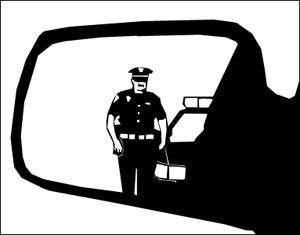 From 2006, some thoughts on the death of Elisabeth Schwarzkopf:
From 2006, some thoughts on the death of Elisabeth Schwarzkopf:
We are all flawed creatures, and one of the impenetrable mysteries of beautiful art is that it can be made by ugly souls. So feel free to mourn the death of Elisabeth Schwarzkopf, and to speak admiringly of her artistry–but when you do so, remember that there was more to her than the music she made….
Read the whole thing here.
TT: Almanac
“He didn’t have anything to say about death; the only thing he ever had anything to say about was music. From his own point of view as a pianist and trumpet player he could tell you whether a piece was hard or easy; in a larger sense, as critic, he could say right off whether a thing was good or bad. His instinctive taste was infalllible within the bounds of his chosen field. Outside of that he was deaf, dumb, blind, even slightly halt and more or less lame. What was death to him; what was plane geometry; what was Spanish Conversation and Composition?”
Dorothy Baker, Young Man With a Horn
TT: When radio wasn’t
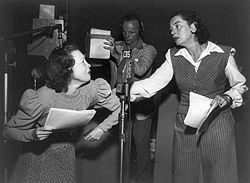 I’ve been so preoccupied with Satchmo at the Waldorf that I haven’t been paying nearly enough attention to this blog. I meant, for instance, to write a lengthy posting about something important that happened fifty years ago yesterday and is now almost entirely forgotten. Alas, I didn’t have time to do it justice, so merely mentioning it today will have to suffice: CBS pulled the plug on the last two surviving network radio dramas, Suspense and Yours Truly, Johnny Dollar, on September 30, 1962.
I’ve been so preoccupied with Satchmo at the Waldorf that I haven’t been paying nearly enough attention to this blog. I meant, for instance, to write a lengthy posting about something important that happened fifty years ago yesterday and is now almost entirely forgotten. Alas, I didn’t have time to do it justice, so merely mentioning it today will have to suffice: CBS pulled the plug on the last two surviving network radio dramas, Suspense and Yours Truly, Johnny Dollar, on September 30, 1962.
Both series had had long and successful runs–Suspense made its debut in 1942, Johnny Dollar in 1949–but the lights started to go out on old-time radio drama as early as 1948, the year when TV finally got going in earnest. The surprising thing, truth to tell, is that it lasted as long as it did, all the way into the Age of Camelot.
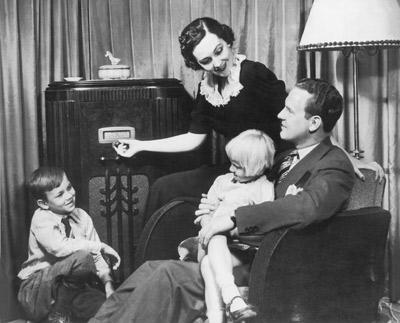 The ranks of those who remember what golden-age radio meant to those who grew up with it are shrinking by the hour. I’m far too young to qualify, of course, but I’ve always been fascinated by what is now called “old-time radio,” and in 1996 I wrote a column for the now-defunct magazine Civilization in which I tried to explain how central it had been to American life in the first half of the twentieth century:
The ranks of those who remember what golden-age radio meant to those who grew up with it are shrinking by the hour. I’m far too young to qualify, of course, but I’ve always been fascinated by what is now called “old-time radio,” and in 1996 I wrote a column for the now-defunct magazine Civilization in which I tried to explain how central it had been to American life in the first half of the twentieth century:
Once upon a time there was radio, and it was beloved. Nobody loves TV: we take it for granted, like air or water. Radio was different. America is a big country, so big that newspapers and express trains did little to shrink it, and for most of its long history it was intensely provincial, simply by virtue of its vastness. Unless you were rich enough to travel, you knew only your town and the places nearby; the rest you read about in books, or visited once in a blue moon. But then radio came along, and all at once Americans could hear each other, no matter where they lived. You twisted a knob on the Atwater Kent in the living room in Dubuque or Diehlstadt, and suddenly you could hear Fred Allen cracking bone-dry jokes in a studio in Manhattan–or Ed Murrow standing on a London rooftop, listening to the German bombers roar through the night sky. And all of it was live: it happened and you heard it, just like that.
Indeed you did–but a time eventually came when ordinary people started to take the miracle for granted. In due course it was superseded by yet another, gaudier miracle, and that was that.
I wonder who (if anybody) was listening to the CBS Radio Network on the night of September 30, 1962. A couple of months ago I wrote a “Sightings” column for The Wall Street Journal in which I argued that 1962 was the year in which the world of postmodernity first started to take recognizable shape. I cited the premiere of Edward Albee’s Who’s Afraid of Virginia Woolf? as an example of how America was in the process of breaking with what I called “the earnest, self-confident tone of postwar culture.” How amazing, then, to think that Virginia Woolf opened on Broadway just thirteen days after Suspense and Johnny Dollar breathed their last. Sometimes–maybe most of the time–nothing much happens when worlds collide.
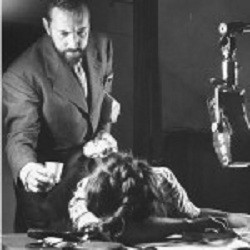 Forgive me for quoting myself yet again, but I wrote a sentence in the introduction to the Teachout Reader that strikes me as worth recalling in this connection: “I feel the temptation to live in the past, but one can truly live only in the moment, and the last thing I want to do is end up like the pathetic narrator of ‘Hey Nineteen,’ the Steely Dan song about a no-longer-young baby boomer who tries to tell his teenaged girlfriend about Aretha Franklin but discovers that ‘she don’t remember/The Queen of Soul,’ subsequently realizing that ‘we got nothing in common/No, we can’t talk at all.'”
Forgive me for quoting myself yet again, but I wrote a sentence in the introduction to the Teachout Reader that strikes me as worth recalling in this connection: “I feel the temptation to live in the past, but one can truly live only in the moment, and the last thing I want to do is end up like the pathetic narrator of ‘Hey Nineteen,’ the Steely Dan song about a no-longer-young baby boomer who tries to tell his teenaged girlfriend about Aretha Franklin but discovers that ‘she don’t remember/The Queen of Soul,’ subsequently realizing that ‘we got nothing in common/No, we can’t talk at all.'”
I still feel that way, but it doesn’t stop me from listening to old episodes of Dragnet or Gunsmoke (both of which were better on radio than on TV) and wishing that I could turn back the clock to a time I never knew. The English language needs a word whose definition would be “nostalgia for that which one has not experienced.” That’s how I feel about the lost world of old-time radio. No, I wouldn’t want to live there, but I have a feeling that it would be a very, very nice place to visit.
* * *
To listen to the final episode of Suspense, go here.
To listen to the final episode of Yours Truly, Johnny Dollar, go here.
Jeff Kallman takes note of the golden anniversary of the end of network radio drama.
A scene from Woody Allen’s Radio Days:
TT: Turn, magic wheel!
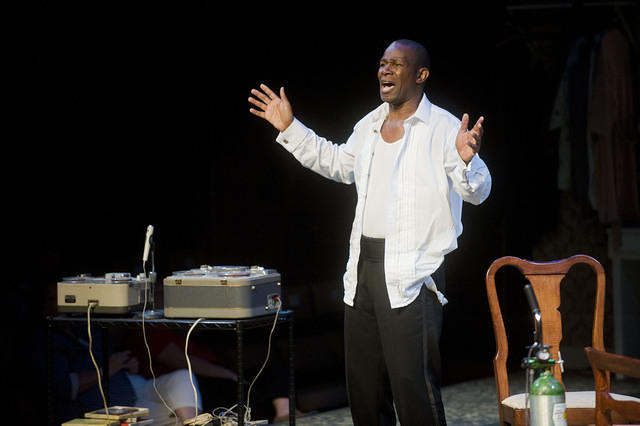 The great engine of publicity is starting to have its way with Satchmo at the Waldorf, which begins public performances in New Haven this Wednesday. On Friday the New Haven Register ran an interview with John Douglas Thompson written by Donna Doherty, the paper’s arts editor:
The great engine of publicity is starting to have its way with Satchmo at the Waldorf, which begins public performances in New Haven this Wednesday. On Friday the New Haven Register ran an interview with John Douglas Thompson written by Donna Doherty, the paper’s arts editor:
The play captures a wistful [Louis] Armstrong looking back on his career and some of the choices he made, questioning whether the price was too high or whether he made the correct choice, including his relationship with [Joe] Glaser. But the audience, when [John Douglas] Thompson is in the Glaser character, learns some of the behind-the-scenes maneuverings that Armstrong never knew about, some good, some bad.
Thompson says he can identify with Armstrong as a person of the same race, and though Glaser was white, “What I have in common with him is we come from the human race. That’s enough for me to work my way in. But it’s always the writing, always the playwright to open the door. If you don’t have their words to open the door, it’s not going to work.
“My performance has been constructed out of Terry’s imagination. He gave me something to follow. Then you have someone like Gordon [Edelstein], who’s really vigilant at culling things out of words, putting things around you, whether it’s lighting or props. This is one of those times when me, Terry and Gordon, it’s been this truly creative process….”
To read the whole thing, go here.
On Sunday the Hartford Courant ran a feature story by Frank Rizzo, the paper’s drama critic:
There was more to jazz great Louis Armstrong than what people saw on “The Ed Sullivan Show,” says Terry Teachout, who wrote a comprehensive biography of the beloved performer titled “Pops: A Life of Louis Armstrong.”
Teachout, who is also theater critic for The Wall Street Journal, gives his story a theatrical life in “Satchmo at the Waldorf,” which begin performances Wednesday, Oct. 3, at New Haven’s Long Wharf Theater, staged by its artistic director Gordon Edelstein. The production had a late summer run in the Massachusetts Berkshires at Shakespeare & Company in Lenox….
“This is not just storytelling but a real play with real conflict,” says Teachout, who says he has no problems being on the other side of the critical pen. “This is more than what Gordon calls ‘a taxidermy play,’ which is a famous guy sitting around talking for two hours about what a great guy he is.”…
To read the whole thing, go here.
